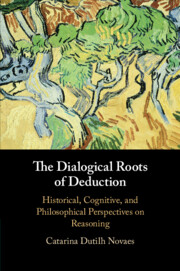 The Dialogical Roots of Deduction
The Dialogical Roots of Deduction Book contents
- The Dialogical Roots of Deduction
- The Dialogical Roots of Deduction
- Copyright page
- Contents
- Figures
- Preface
- Part I The Philosophy of Deduction
- Part II The History of Deduction
- 5 Deduction in Mathematics and Dialectic in Ancient Greece
- 6 Aristotle’s Syllogistic and Other Ancient Logical Traditions
- 7 Logic and Deduction in the Middle Ages and the Modern Period
- Part III Deduction and Cognition
- References
- Index
6 - Aristotle’s Syllogistic and Other Ancient Logical Traditions
from Part II - The History of Deduction
Published online by Cambridge University Press: 10 December 2020
- The Dialogical Roots of Deduction
- The Dialogical Roots of Deduction
- Copyright page
- Contents
- Figures
- Preface
- Part I The Philosophy of Deduction
- Part II The History of Deduction
- 5 Deduction in Mathematics and Dialectic in Ancient Greece
- 6 Aristotle’s Syllogistic and Other Ancient Logical Traditions
- 7 Logic and Deduction in the Middle Ages and the Modern Period
- Part III Deduction and Cognition
- References
- Index
Summary
This chapter argues that Aristotle’s syllogistic emerged from a dialectical matrix as well as from considerations pertaining to scientific demonstration and demonstration in mathematics. This means that, even early on, non-dialogical components motivated and were integrated into theories and practices of deduction. The chapter also briefly discusses two other formidable ancient intellectual traditions and their reflections on logic and reasoning, namely the Indian tradition and the Chinese tradition. It is argued that, while these were indeed highly sophisticated, fully-fledged theories of deduction are not to be found in classical Indian or classical Chinese thought.
Keywords
- Type
- Chapter
- Information
- The Dialogical Roots of DeductionHistorical, Cognitive, and Philosophical Perspectives on Reasoning, pp. 108 - 130Publisher: Cambridge University PressPrint publication year: 2020


